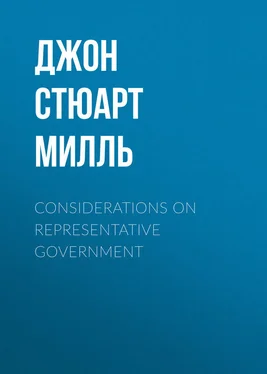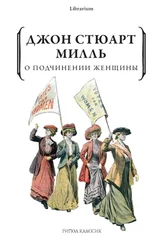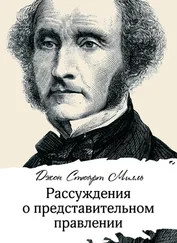Джон Милль - Considerations on Representative Government
Здесь есть возможность читать онлайн «Джон Милль - Considerations on Representative Government» — ознакомительный отрывок электронной книги совершенно бесплатно, а после прочтения отрывка купить полную версию. В некоторых случаях можно слушать аудио, скачать через торрент в формате fb2 и присутствует краткое содержание. Жанр: Философия, literature_19, foreign_antique, foreign_prose, на английском языке. Описание произведения, (предисловие) а так же отзывы посетителей доступны на портале библиотеки ЛибКат.
- Название:Considerations on Representative Government
- Автор:
- Жанр:
- Год:неизвестен
- ISBN:нет данных
- Рейтинг книги:3 / 5. Голосов: 1
-
Избранное:Добавить в избранное
- Отзывы:
-
Ваша оценка:
- 60
- 1
- 2
- 3
- 4
- 5
Considerations on Representative Government: краткое содержание, описание и аннотация
Предлагаем к чтению аннотацию, описание, краткое содержание или предисловие (зависит от того, что написал сам автор книги «Considerations on Representative Government»). Если вы не нашли необходимую информацию о книге — напишите в комментариях, мы постараемся отыскать её.
Considerations on Representative Government — читать онлайн ознакомительный отрывок
Ниже представлен текст книги, разбитый по страницам. Система сохранения места последней прочитанной страницы, позволяет с удобством читать онлайн бесплатно книгу «Considerations on Representative Government», без необходимости каждый раз заново искать на чём Вы остановились. Поставьте закладку, и сможете в любой момент перейти на страницу, на которой закончили чтение.
Интервал:
Закладка:
The failure of any of these conditions renders a form of government, whatever favorable promise it may otherwise hold out, unsuitable to the particular case.
The first obstacle, the repugnance of the people to the particular form of government, needs little illustration, because it never can in theory have been overlooked. The case is of perpetual occurrence. Nothing but foreign force would induce a tribe of North American Indians to submit to the restraints of a regular and civilized government. The same might have been said, though somewhat less absolutely, of the barbarians who overran the Roman Empire. It required centuries of time, and an entire change of circumstances, to discipline them into regular obedience even to their own leaders, when not actually serving under their banner. There are nations who will not voluntarily submit to any government but that of certain families, which have from time immemorial had the privilege of supplying them with chiefs. Some nations could not, except by foreign conquest, be made to endure a monarchy; others are equally averse to a republic. The hindrance often amounts, for the time being, to impracticability.
But there are also cases in which, though not averse to a form of government – possibly even desiring it – a people may be unwilling or unable to fulfill its conditions. They may be incapable of fulfilling such of them as are necessary to keep the government even in nominal existence. Thus a people may prefer a free government; but if, from indolence, or carelessness, or cowardice, or want of public spirit, they are unequal to the exertions necessary for preserving it; if they will not fight for it when it is directly attacked; if they can be deluded by the artifices used to cheat them out of it; if, by momentary discouragement, or temporary panic, or a fit of enthusiasm for an individual, they can be induced to lay their liberties at the feet even of a great man, or trust him with powers which enable him to subvert their institutions – in all these cases they are more or less unfit for liberty; and though it may be for their good to have had it even for a short time, they are unlikely long to enjoy it. Again, a people may be unwilling or unable to fulfill the duties which a particular form of government requires of them. A rude people, though in some degree alive to the benefits of civilized society, may be unable to practice the forbearances which it demands; their passions may be too violent, or their personal pride too exacting, to forego private conflict, and leave to the laws the avenging of their real or supposed wrongs. In such a case, a civilized government, to be really advantageous to them, will require to be in a considerable degree despotic; one over which they do not themselves exercise control, and which imposes a great amount of forcible restraint upon their actions. Again, a people must be considered unfit for more than a limited and qualified freedom who will not co-operate actively with the law and the public authorities in the repression of evil-doers. A people who are more disposed to shelter a criminal than to apprehend him; who, like the Hindoos, will perjure themselves to screen the man who has robbed them, rather than take trouble or expose themselves to vindictiveness by giving evidence against him; who, like some nations of Europe down to a recent date, if a man poniards another in the public street, pass by on the other side, because it is the business of the police to look to the matter, and it is safer not to interfere in what does not concern them; a people who are revolted by an execution, but not shocked at an assassination – require that the public authorities should be armed with much sterner powers of repression than elsewhere, since the first indispensable requisites of civilized life have nothing else to rest on. These deplorable states of feeling, in any people who have emerged from savage life, are, no doubt, usually the consequence of previous bad government, which has taught them to regard the law as made for other ends than their good, and its administrators as worse enemies than those who openly violate it. But, however little blame may be due to those in whom these mental habits have grown up, and however the habits may be ultimately conquerable by better government, yet, while they exist, a people so disposed can not be governed with as little power exercised over them as a people whose sympathies are on the side of the law, and who are willing to give active assistance in its enforcement. Again, representative institutions are of little value, and may be a mere instrument of tyranny or intrigue, when the generality of electors are not sufficiently interested in their own government to give their vote, or, if they vote at all, do not bestow their suffrages on public grounds, but sell them for money, or vote at the beck of some one who has control over them, or whom for private reasons they desire to propitiate. Popular election thus practiced, instead of a security against misgovernment, is but an additional wheel in its machinery.
Besides these moral hindrances, mechanical difficulties are often an insuperable impediment to forms of government. In the ancient world, though there might be, and often was, great individual or local independence, there could be nothing like a regulated popular government beyond the bounds of a single city-community; because there did not exist the physical conditions for the formation and propagation of a public opinion, except among those who could be brought together to discuss public matters in the same agora. This obstacle is generally thought to have ceased by the adoption of the representative system. But to surmount it completely, required the press, and even the newspaper press, the real equivalent, though not in all respects an adequate one, of the Pnyx and the Forum. There have been states of society in which even a monarchy of any great territorial extent could not subsist, but unavoidably broke up into petty principalities, either mutually independent, or held together by a loose tie like the feudal: because the machinery of authority was not perfect enough to carry orders into effect at a great distance from the person of the ruler. He depended mainly upon voluntary fidelity for the obedience even of his army, nor did there exist the means of making the people pay an amount of taxes sufficient for keeping up the force necessary to compel obedience throughout a large territory. In these and all similar cases, it must be understood that the amount of the hindrance may be either greater or less. It may be so great as to make the form of government work very ill, without absolutely precluding its existence, or hindering it from being practically preferable to any other which can be had. This last question mainly depends upon a consideration which we have not yet arrived at – the tendencies of different forms of government to promote Progress.
We have now examined the three fundamental conditions of the adaptation of forms of government to the people who are to be governed by them. If the supporters of what may be termed the naturalistic theory of politics, mean but to insist on the necessity of these three conditions; if they only mean that no government can permanently exist which does not fulfill the first and second conditions, and, in some considerable measure, the third; their doctrine, thus limited, is incontestable. Whatever they mean more than this appears to me untenable. All that we are told about the necessity of an historical basis for institutions, of their being in harmony with the national usages and character, and the like, means either this, or nothing to the purpose. There is a great quantity of mere sentimentality connected with these and similar phrases, over and above the amount of rational meaning contained in them. But, considered practically, these alleged requisites of political institutions are merely so many facilities for realising the three conditions. When an institution, or a set of institutions, has the way prepared for it by the opinions, tastes, and habits of the people, they are not only more easily induced to accept it, but will more easily learn, and will be, from the beginning, better disposed, to do what is required of them both for the preservation of the institutions, and for bringing them into such action as enables them to produce their best results. It would be a great mistake in any legislator not to shape his measures so as to take advantage of such pre-existing habits and feelings when available. On the other hand, it is an exaggeration to elevate these mere aids and facilities into necessary conditions. People are more easily induced to do, and do more easily, what they are already used to; but people also learn to do things new to them. Familiarity is a great help; but much dwelling on an idea will make it familiar, even when strange at first. There are abundant instances in which a whole people have been eager for untried things. The amount of capacity which a people possess for doing new things, and adapting themselves to new circumstances; is itself one of the elements of the question. It is a quality in which different nations, and different stages of civilization, differ much from one another. The capability of any given people for fulfilling the conditions of a given form of government can not be pronounced on by any sweeping rule. Knowledge of the particular people, and general practical judgment and sagacity, must be the guides.
Читать дальшеИнтервал:
Закладка:
Похожие книги на «Considerations on Representative Government»
Представляем Вашему вниманию похожие книги на «Considerations on Representative Government» списком для выбора. Мы отобрали схожую по названию и смыслу литературу в надежде предоставить читателям больше вариантов отыскать новые, интересные, ещё непрочитанные произведения.
Обсуждение, отзывы о книге «Considerations on Representative Government» и просто собственные мнения читателей. Оставьте ваши комментарии, напишите, что Вы думаете о произведении, его смысле или главных героях. Укажите что конкретно понравилось, а что нет, и почему Вы так считаете.











